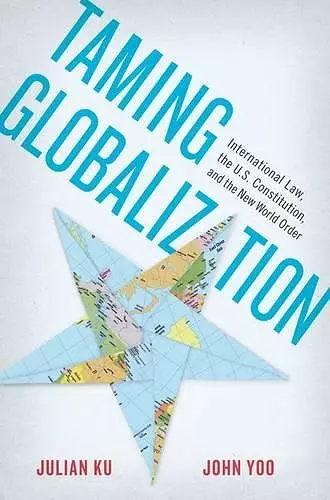Taming Globalization
International Law, the U.S. Constitution, and the New World Order
John Yoo author Julian Ku author
Format:Hardback
Publisher:Oxford University Press Inc
Published:5th Apr '12
Currently unavailable, and unfortunately no date known when it will be back

In 1997, a Mexican national named Jose Ernesto Medellin was sentenced to death for raping and murdering two teenage girls in Texas. In 2004, the International Court of Justice ruled that he was entitled to a appellate review of his sentence since the arresting officers had not informed him of his right to seek assistance from the Mexican consulate prior to trial, as prescribed by a treaty ratified by Congress in 1963. In 2008, amid fierce controversy, the U.S. Supreme Court declared that the international ruling had no weight. Medellin subsequently was executed. As Julian Ku and John Yoo show in Taming Globalization, the Medellin case only hints at the legal complications that will embroil American courts in the twenty-first century. Like Medellin, tens of millions of foreign citizens live in the United States; and like the International Court of Justice, dozens of international institutions cast a legal net across the globe, from border commissions to the World Trade Organization. Ku and Yoo argue that all this presents an unavoidable challenge to American constitutional law, particularly the separation of powers between the branches of federal government and between Washington and the states. To reconcile the demands of globalization with a traditional, formal constitutional structure, they write, we must re-conceptualize the Constitution, as Americans did in the early twentieth century, when faced with nationalization. They identify three "mediating devices" we must embrace: non-self-execution of treaties, recognition of the President's power to terminate international agreements and interpret international law, and a reliance on state implementation of international law and agreements. These devices will help us avoid constitutional difficulties while still gaining the benefits of international cooperation. Written by a leading advocate of executive power and a fellow Constitutional scholar, Taming Globalization promises to spark widespread debate.
"This splendid book gives a comprehensive statement of a jurisprudence of democratic constitutional sovereignty in the United States, even in a globalizing world, against liberal internationalism and its efforts to rewrite American law as a regulatory sub-branch of globalization. It goes well beyond a re-statement of democratic sovereignty, however, to offer new arguments that are sure to be debated sharply among foreign relations and federalism scholars of all kinds, a vigorously argued claim of the role of individual states in implementing and interpreting international law." --Ken Anderson, Professor of Law, American University "In their provocative new book, John Yoo and Julian Ku vigorously defend the primacy of the U.S. Constitution in every area of globalization-trade, treaties and more. Yes, the U.S. often must cooperate with other countries to tackle global problems but it must do so in line with Constitutional principles. Their arguments are compelling, their prose is vigorous, and their analysis is often surprising." --Melanie Kirkpatrick, Senior Fellow, Hudson Institute, and former deputy editorial page editor, The Wall Street Journal. "With nuance and clarity, John Yoo and Julian Ku develop ideas about how domestic U.S. actors can account for international law in a way that is consistent with popular sovereignty under the Constitution. This should be essential reading for senators and their staffers who have to consider whether to ratify treaties only if they are non-self-executing, for judges and their clerks who have to choose when to refer to foreign laws and when not to do so, and for officials who have to decide when to obey or disobey customary international law. This book stands to shift debates among scholars from tired fights about whether or not international law is really 'law' to more a useful discussion about what decisionmakers ought to do in pressing international legal problems." --Tai-Heng Cheng, Professor of Law and Co-Director, Institute for Global Law, Justice, & Policy at New York Law School "The book offers a strong critique of transnationalist claims and advances a defense of US constitutional and political sovereignty...the book provides a carefully constructed argument." --CHOICE, M.F. Cairo, Transylvania University
ISBN: 9780199837427
Dimensions: 157mm x 236mm x 25mm
Weight: 499g
280 pages